- Home
- E. B. White
The Trumpet of the Swan Page 2
The Trumpet of the Swan Read online
Page 2
For the next hour, the cob paddled slowly round and around the tiny island, keeping watch. His wife remained quietly on the nest. Sam sat on his log, hardly moving a muscle. He was spellbound at the sight of the swans. They were the biggest water birds he had ever seen. He had heard their trumpeting and had searched the woods and swamps until he had found the pond and located the nest. Sam knew enough about birds to know that these were Trumpeters. Sam always felt happy when he was in a wild place among wild creatures. Sitting on his log, watching the swans, he had the same good feeling some people get when they are sitting in church.
After he had watched for an hour, Sam got up. He walked slowly and quietly away, putting one foot straight ahead of the other, Indian-fashion, hardly making a sound. The swans watched him go. When the female left the nest, she turned and looked back. There, lying safely in the soft feathers at the bottom of the nest, was the fourth egg. The cob waddled out onto the island and looked in the nest.
"A masterpiece!"he said. "An egg of supreme beauty and perfect proportions. I would say that that egg is almost five inches in length."
His wife was pleased.
When the swan had laid five eggs, she felt satisfied. She gazed at them proudly. Then she settled herself on the nest to keep her eggs warm. Carefully, she reached down with her bill and poked each egg until it was in just the right spot to receive the heat from her body. The cob cruised around close by, to keep her company and protect her from enemies. He knew that a fox prowled somewhere in the woods; he had heard him barking on nights when the hunting was good.
Days passed, and still the swan sat quietly on the five eggs. Nights passed. She sat and sat, giving her warmth to the eggs. No one disturbed her. The boy was gone--perhaps he would never come back. Inside of each egg, something was happening that she couldn't see: a little swan was taking shape. As the weeks went by, the days grew longer, the nights grew shorter. When a rainy day came, the swan just sat still and let it rain.
"My dear," said her husband, the cob, one afternoon, "do you never find your duties onerous or irksome? Do you never tire of sitting in one place and in one position, covering the eggs, with no diversions, no pleasures, no escapades, or capers? Do you never suffer from boredom?"
"No," replied his wife. "Not really."
"Isn't it uncomfortable to sit on eggs?"
"Yes, it is," replied the wife. "But I can put up with a certain amount of discomfort for the sake of bringing young swans into the world."
"Do you know how many more days you must sit?" he asked.
"Haven't any idea," she said. "But I notice that the ducks at the other end of the pond have hatched their young ones; I notice that the Red-winged Blackbirds have hatched theirs, and the other evening I saw a Striped Skunk hunting along the shore, and she had four little skunks with her. So I think I must be getting near the end of my time. With any luck, we will soon be able to see our children--our beautiful little cygnets."
"Don't you ever feel the pangs of hunger or suffer the tortures of thirst?" asked the cob.
"Yes, I do," said his mate. "As a matter of fact, I could use a drink right now."
The afternoon was warm; the sun was bright. The swan decided she could safely leave her eggs for a few minutes. She stood up. First she pushed some loose feathers around the eggs, hiding them from view and giving them a warm covering in her absence. Then she stepped off the nest and entered the water. She took several quick drinks. Then she glided over to a shallow place, thrust her head underwater, and pulled up tender greens from the bottom. She next took a bath by tossing water over herself. Then she waddled out onto a grassy bank and stood there, preening her feathers.
The swan felt good. She had no idea that an enemy was near. She failed to notice the Red Fox as he watched her from his hiding place behind a clump of bushes. The fox had been attracted to the pond by the sound of splashing water. He hoped he would find a goose. Now he sniffed the air and smelled the swan. Her back was turned, so he began creeping slowly toward her. She would be too big for him to carry, but he decided he would kill her anyway and get a taste of blood. The cob, her husband, was still floating on the pond. He spied the fox first.
"Look out!" he trumpeted. "Look out for the fox, who is creeping toward you even as I speak, his eyes bright, his bushy tail out straight, his mind lusting for blood, his belly almost touching the ground! You are in grave danger, and we must act immediately."
While the cob was making this elegant speech of warning, something happened that surprised everybody. Just as the fox was about to spring and sink his teeth in the swan's neck, a stick came hurtling through the air. It struck the fox full on the nose, and he turned and ran away. The two swans couldn't imagine what had happened. Then they noticed a movement in the bushes. Out stepped Sam Beaver, the boy who had visited them a month ago. Sam was grinning. In his hand he held another stick, in case the fox should return. But the fox was in no mood to return. He had a very sore nose, and he had lost his appetite for fresh swan.
"Hello," said Sam in a low voice.
"Ko-hoh, ko-hoh!" replied the cob.
"Ko-hoh!" said his wife. The pond rang with the trumpet sounds--sounds of triumph over the fox, sounds of victory and gladness.
Sam was thrilled at the noise of swans, which some people say is like the sound of a French horn. He walked slowly around the shore to the little point of land near the island and sat down on his log. The swans now realized, beyond any doubt, that the boy was their friend. He had saved the swan's life. He had been in the right place at the right time and with the right ammunition. The swans felt grateful. The cob swam over toward Sam, climbed out of the pond, and stood close to the boy, looking at him in a friendly way and arching his neck gracefully. Once, he ran his neck far out, cautiously, and almost touched the boy. Sam never moved a muscle. His heart thumped from excitement and joy.
The female paddled back to her nest and returned to the job of warming the eggs. She felt lucky to be alive.
That night before Sam crawled into his bunk at camp, he got out his notebook and found a pencil. This is what he wrote:
I don't know of anything in the entire world more wonderful to look at than a nest with eggs in it. An egg, because it contains life, is the most perfect thing there is. It is beautiful and mysterious. An egg is a far finer thing than a tennis ball or a cake of soap. A tennis ball will always be just a tennis ball. A cake of soap will always be just a cake of soap--until it gets so small nobody wants it and they throw it away. But an egg will someday be a living creature. A swan's egg will open and out will come a little swan. A nest is almost as wonderful and mysterious as an egg. How does a bird know how to make a nest? Nobody ever taught her. How does a bird know how to build a nest?
Sam closed his notebook, said good night to his father, blew out his lamp, and climbed into his bunk. He lay there wondering how a bird knows how to build a nest. Pretty soon his eyes closed, and he was asleep.
CHAPTER 4
THE CYGNETS
During the night, the swan thought she heard a pipping sound from the eggs. And in the hour just before dawn, she was sure she felt a slight movement under her breast, as though a tiny body were wiggling there. Perhaps the eggs at last were hatching. Eggs, of course, can't wiggle, so the swan decided she must have something under her that wasn't an egg. She sat perfectly still, listening and waiting. The cob floated nearby, keeping watch.
A little swan enclosed in an egg has a hard time getting out. It never would get out if Nature had not provided it with two important things: a powerful neck-muscle and a small dagger-tooth on the tip of its bill. This tooth is sharp, and the baby swan uses it to pick a hole in the tough shell of the egg. Once the hole is made, the rest is easy. The cygnet can breathe now; it just keeps wiggling until it wiggles free.
The cob was expecting to become a father any minute now. The idea of fatherhood made him feel poetical and proud. He began to talk to his wife.
"Here I glide, swanlike," he said, "while ea
rth is bathed in wonder and beauty. Now, slowly, the light of day comes into our sky. A mist hangs low over the pond. The mist rises slowly, like steam from a kettle, while I glide, swanlike, while eggs hatch, while young swans come into existence. I glide and glide. The light strengthens. The air becomes warmer. Gradually the mist disappears. I glide, I glide, swanlike. Birds sing their early song. Frogs that have croaked in the night stop croaking and are silent. Still I glide, ceaselessly, like a swan."
"Of course you glide like a swan," said his wife. "How else could you glide? You couldn't glide like a moose, could you?"
"Well, no. That is quite true. Thank you, my dear, for correcting me." The cob felt taken aback by his mate's commonsense remark. He enjoyed speaking in fancy phrases and graceful language, and he liked to think of himself as gliding swanlike. He decided he'd better do more gliding and less talking.
All morning long, the swan heard the pipping of the shells. And every once in a while, she felt something wriggle beneath her in the nest. It was an odd sensation. The eggs had been quiet for so many, many days--thirty-five days in all--and now at last they were stirring with life. She knew that the proper thing to do was to sit still.
Late in the afternoon, the swan was rewarded for her patience. She gazed down, and there, pushing her feathers aside, came a tiny head--the first baby, the first cygnet. It was soft and downy. Unlike its parents, it was gray. Its feet and legs were the color of mustard. Its eyes were bright. On unsteady legs, it pushed its way up until it stood beside its mother, looking around at the world it was seeing for the first time. Its mother spoke softly to it, and it was glad to hear her voice. It was glad to breathe the air, after being cooped up so long inside an egg.
The cob, who had been watching intently all day, saw the little head appear. His heart leapt up with joy. "A cygnet!" he cried. "A cygnet at last! I am a father, with all the pleasant duties and awesome responsibilities of fatherhood. O blessed little son of mine, how good it is to see your face peering through the protecting feathers of your mother's breast, under these fair skies, with the pond so quiet and peaceful in the long light of afternoon!"
"What makes you think it's a son?" inquired his wife. "For all you know, it's a daughter. Anyway, it's a cygnet, and it's alive and healthy. I can feel others under me, too. Perhaps we'll get a good hatch. We may even get all five. We'll know by tomorrow."
"I have every confidence that we will," said the cob.
Next morning very early, Sam Beaver crawled out of his bunk while his father was still asleep. Sam dressed and lit a fire in the stove. He fried a few strips of bacon, toasted two slices of bread, poured a glass of milk, and sat down and ate breakfast. When he was through, he found a pencil and paper and wrote a note.
I have gone for a walk. Will be back for lunch.
Sam left the note where his father would find it; then he took his field glasses and his compass, fastened his hunting knife to his belt, and set out through the woods and over the swamp to the pond where the swans lived.
He approached the pond cautiously, his fieldglasses slung over his shoulder. It was still only a little after seven o'clock; the sun was pale, the air was chill. The morning smelled delicious. When he reached his log, Sam sat down and adjusted his glasses. Seen through the glasses, the nesting swan appeared to be only a few feet away. She was sitting very close, not moving. The cob was nearby. Both birds were listening and waiting. Both birds saw Sam, but they didn't mind his being there--in fact, they rather liked it. They were surprised at the field glasses, though.
"The boy seems to have very big eyes today," whispered the cob. "His eyes are enormous."
"I think those big eyes are actually a pair of field glasses," replied the swan. "I'm not sure, but I think that when a person looks through field glasses, everything appears closer and bigger."
"Will the boy's glasses make me appear even larger than I am?" asked the cob, hopefully.
"I think so," said the swan.
"Oh, well, I like that," said the cob. "I like that very much. Perhaps the boy's glasses will make me appear not only larger than I am but even more graceful than I am. Do you think so?"
"It's possible," said his wife, "but it's not likely. You'd better not get too graceful--it might go to your head. You're quite a vain bird."
"All swans are vain," said the cob. "It is right for swans to feel proud, graceful--that's what swans are for."
Sam could not make out what the swans were saying; he merely knew they were having a conversation, and just hearing them talk stirred his blood. It satisfied him to be keeping company with these two great birds in the wilderness. He was perfectly happy.
In midmorning, when the sun had gained the sky, Sam lifted his glasses again and focused them on the nest. At last he saw what he had come to see: a tiny head, thrusting through the mother's feathers, the head of a baby Trumpeter. The youngster scrambled up onto the edge of the nest. Sam could see its gray head and neck, its body covered with soft down, its yellow legs and feet with their webs for swimming. Soon another cygnet appeared. Then another. Then the first one worked his way down into his mother's feathers again, for warmth. Then one tried to climb up his mother's back, but her feathers were slippery, and he slid off and settled himself neatly at her side. The swan just sat and sat, enjoying her babies, watching them gain the use of their legs.
An hour went by. One of the cygnets, more daring than the others, left the nest and teetered around on the shore of the little island. When this happened, the mother swan stood up. She decided the time had come to lead her children into the water.
"Come on!" she said. "And stay together! Note carefully what I do. Then you do the same. Swimming is easy."
"One, two, three, four, five," Sam counted. "One, two, three, four, five. Five cygnets, just as sure as I'm alive!"
The cob, as he saw his children approach the water, felt that he should act like a father. He began by making a speech.
"Welcome to the pond and the swamp adjacent!" he said. "Welcome to the world that contains this lonely pond, this splendid marsh, unspoiled and wild! Welcome to sunlight and shadow, wind and weather; welcome to water! The water is a swan's particular element, as you will soon discover. Swimming is no problem for a swan. Welcome to danger, which you must guard against--the vile fox with his stealthy tread and sharp teeth, the offensive otter who swims up under you and tries to grab you by the leg, the stinking skunk who hunts by night and blends with the shadows, the coyote who hunts and howls and is bigger than a fox. Beware of lead pellets that lie on the bottom of all ponds, left there by the guns of hunters. Don't eat them--they'll poison you! Be vigilant, be strong, be brave, be graceful, and always follow me! I will go first, then you will come along in single file, and your devoted mother will bring up the rear. Enter the water quietly and confidently!"
The mother swan, glad the speech was over, stepped into the water and called her little ones. The cygnets gazed for a second at the water, then tottered forward, gave a jump, and were afloat. The water felt good. Swimming was simple--nothing to it. The water was good to drink. Each baby dipped up a mouthful. Their happy father arched his long graceful neck over and around them, protectively. Then he set off very slowly, with the cygnets following along in single file. Their mother brought up the rear.
"What a sight!" Sam said to himself. "What a terrific sight! Seven Trumpeters all in line, five of them just out of the egg. This is my lucky day." He hardly noticed how stiff he had become from sitting so long on the log.
Like all fathers, the cob wanted to show off his children to somebody. So he led the cygnets to where Sam was. They all stepped out of the water and stood in front of the boy--all but the mother swan. She stayed behind.
"Ko-hoh!" said the cob.
"Hello!" said Sam, who hadn't expected anything like this and hardly dared breathe.
The first cygnet looked at Sam and said, "Beep."
The second cygnet looked at Sam and said, "Beep."
The third cygn
et greeted Sam the same way. So did the fourth. The fifth cygnet was different. He opened his mouth but didn't say a thing. He made an effort to say beep, but no sound came. So instead, he stuck his little neck out, took hold of one of Sam's shoelaces, and gave it a pull. He tugged at the lace for a moment. It came untied. Then he let it go. It was like a greeting. Sam grinned.
The cob now looked worried. He ran his long white neck between the cygnets and the boy and guided the babies back to the water and to their mother.
"Follow me!" said the cob. And he led them off, full of grace and bursting with pride.
When the mother thought her young ones had had enough swimming and might be chilly, she stepped out onto a sandy shore and squatted down and called them. They quickly followed her out of the pond and burrowed down under her feathers to get warm. In a moment there wasn't a cygnet in sight.
At noon, Sam got up and walked back to camp, his mind full of what he had seen. Next day, he and his father heard Shorty's motor in the sky and saw the plane approaching. They grabbed their duffel bags. "Good-bye, camp! See you in the fall!" said Mr. Beaver, as he shut the door and gave it a pat. He and Sam climbed into the plane and were soon aloft, on their way home to Montana. Mr. Beaver did not know that his son had seen a Trumpeter Swan bring off her young ones. Sam kept the matter to himself.
"If I live to be a hundred years old," thought Sam, "I'll never forget what it feels like to have my shoelace pulled by a baby swan."
Sam and his father were late arriving home at the ranch, but late as it was, Sam got out his diary before he turned in for the night. He wrote:
There are five cygnets. They are sort of a dirty brownish-gray color, but very cute. Their legs are yellow, like mustard. The old cob led them right up to me. I wasn't expecting this, but I kept very still. Four of the babies said beep. The fifth one tried to, but he couldn't. He took hold of my shoelace as though it was a worm and gave it a tug and untied it. I wonder what I'm going to be when I grow up?
He switched off the light, pulled the sheet up over his head, and fell asleep wondering what he was going to be when he grew up.

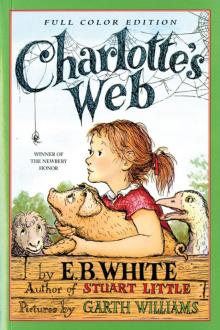 Charlotte's Web
Charlotte's Web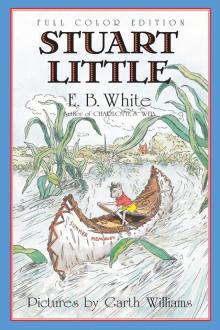 Stuart Little
Stuart Little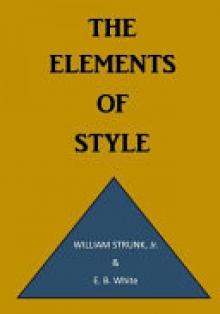 The Elements of Style
The Elements of Style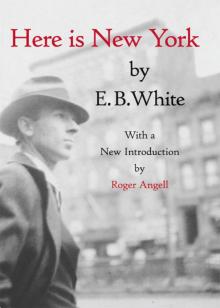 Here Is New York
Here Is New York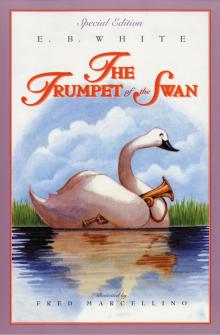 The Trumpet of the Swan
The Trumpet of the Swan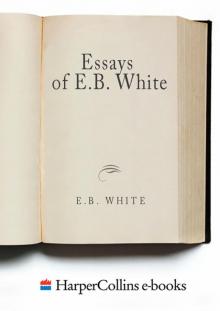 Essays of E. B. White
Essays of E. B. White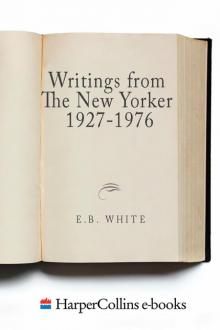 Writings from the New Yorker 1925-1976
Writings from the New Yorker 1925-1976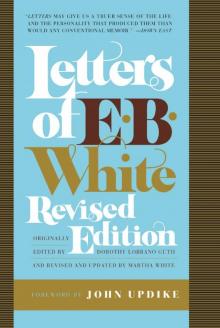 Letters of E. B. White
Letters of E. B. White